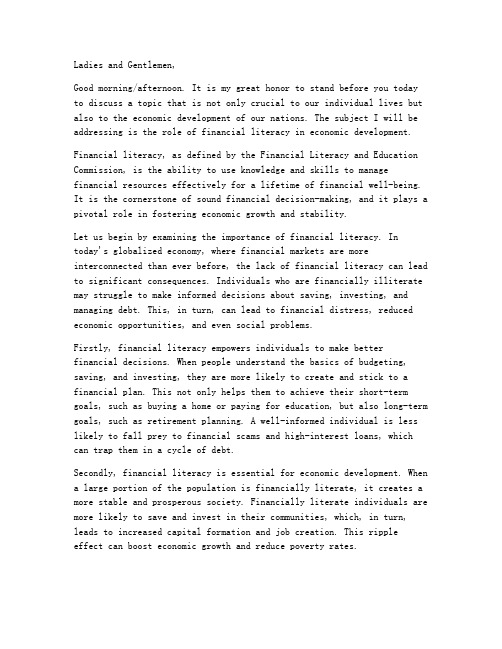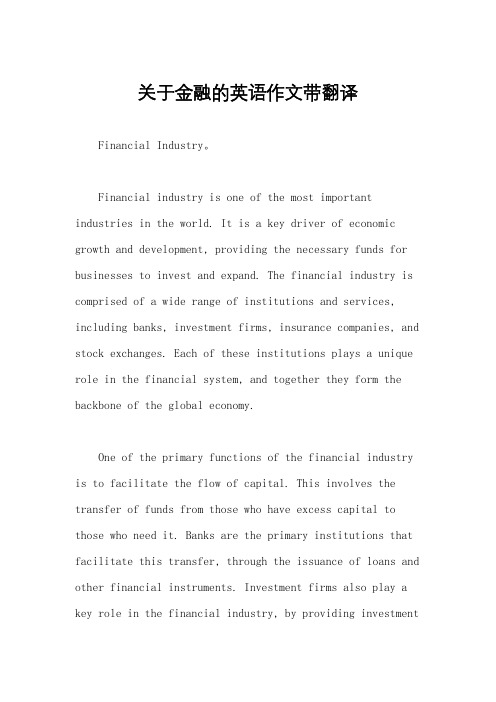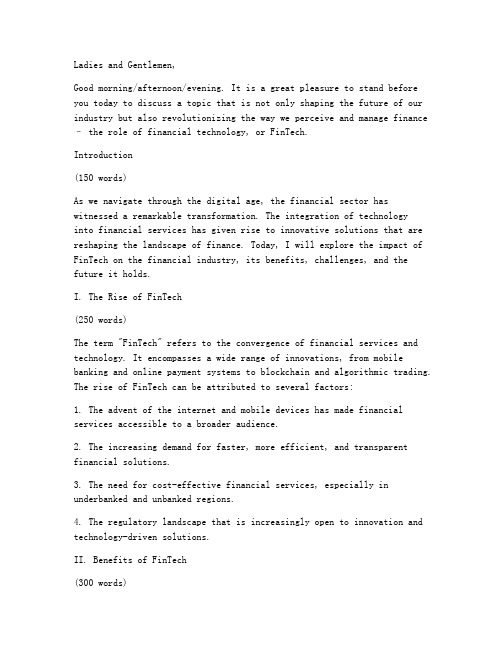金融英语范文LC amendment
面试金融分析员英语小作文

面试金融分析员英语小作文As a financial analyst, I have a strong background in financial analysis and forecasting. I am confident in my ability to analyze financial statements and provide insightful recommendations to clients.In my current role, I have been responsible for analyzing financial data for a variety of clients,including banks, investment firms, and private companies. I have developed strong skills in financial modeling, data analysis, and report writing, which have allowed me to provide valuable insights to my clients.One of my key strengths as a financial analyst is my ability to effectively communicate complex financial information to clients. I am able to break down complex financial concepts into simple terms, which allows clients to make informed decisions based on my recommendations.In addition to my technical skills, I also possessstrong interpersonal skills, which have allowed me to build strong relationships with clients and colleagues. I am a team player who is always willing to go the extra mile to ensure that projects are completed on time and to the highest standard.Looking to the future, I am excited about the opportunities that lie ahead for financial analysts. With the increasing complexity of financial markets and the growing demand for financial analysis services, I believe that there will be many opportunities for growth and development in this field.In conclusion, I am a highly skilled financial analyst with a strong track record of success in analyzingfinancial data and providing valuable insights to clients.I am confident that my skills and experience make me an ideal candidate for any financial analysis role, and I look forward to the opportunity to contribute my expertise to your organization.。
关于金融的英文作文

关于金融的英文作文Financial management is crucial for individuals and businesses to achieve their financial goals and ensurelong-term stability. It involves making smart decisions about budgeting, saving, investing, and managing debt.Investing in the stock market can be a risky but potentially rewarding way to grow your wealth. It's important to do thorough research and consider factors like company performance, market trends, and economic indicators before making investment decisions.Credit cards can be a convenient way to make purchases and build credit, but it's important to use them responsibly. Carrying a balance and only making minimum payments can lead to high interest charges and long-term debt.Saving for retirement is essential for financial security in later years. Contributing to a 401(k) or IRAcan help individuals build a nest egg for the future and take advantage of tax benefits.Insurance is an important part of financial planning, providing protection against unexpected events that could lead to financial hardship. Health, life, and property insurance can help individuals and families mitigate risks and avoid financial devastation.Financial education is key to making informed decisions about money. Learning about personal finance topics like budgeting, investing, and managing debt can empower individuals to take control of their financial futures.。
金融学英语演讲稿范文

Ladies and Gentlemen,Good morning/afternoon. It is my great honor to stand before you today to discuss a topic that is not only crucial to our individual lives but also to the economic development of our nations. The subject I will be addressing is the role of financial literacy in economic development.Financial literacy, as defined by the Financial Literacy and Education Commission, is the ability to use knowledge and skills to manage financial resources effectively for a lifetime of financial well-being. It is the cornerstone of sound financial decision-making, and it plays a pivotal role in fostering economic growth and stability.Let us begin by examining the importance of financial literacy. Intoday's globalized economy, where financial markets are more interconnected than ever before, the lack of financial literacy can lead to significant consequences. Individuals who are financially illiterate may struggle to make informed decisions about saving, investing, and managing debt. This, in turn, can lead to financial distress, reduced economic opportunities, and even social problems.Firstly, financial literacy empowers individuals to make betterfinancial decisions. When people understand the basics of budgeting, saving, and investing, they are more likely to create and stick to a financial plan. This not only helps them to achieve their short-term goals, such as buying a home or paying for education, but also long-term goals, such as retirement planning. A well-informed individual is less likely to fall prey to financial scams and high-interest loans, which can trap them in a cycle of debt.Secondly, financial literacy is essential for economic development. When a large portion of the population is financially literate, it creates a more stable and prosperous society. Financially literate individuals are more likely to save and invest in their communities, which, in turn, leads to increased capital formation and job creation. This rippleeffect can boost economic growth and reduce poverty rates.Thirdly, financial literacy fosters innovation and entrepreneurship. When individuals understand how to manage their finances, they are more likely to take risks and start their own businesses. This entrepreneurial spirit is a key driver of economic development and can lead to the creation of new industries, products, and services.Now, let us delve into the challenges that hinder the spread offinancial literacy. One of the main challenges is the lack of access to quality financial education. In many countries, particularly in developing regions, there is a lack of resources and infrastructure to provide comprehensive financial education to the general population. This is often compounded by cultural barriers and a lack of awareness about the importance of financial literacy.Moreover, financial literacy is not just about teaching people how to manage their finances; it is also about fostering a mindset of financial responsibility and resilience. This requires a multi-faceted approach, including the development of curricula, the training of educators, and the collaboration between governments, financial institutions, and non-profit organizations.To address these challenges, several initiatives have been launched worldwide. For instance, many countries have introduced financial literacy programs in schools, ensuring that students receive basic financial education at a young age. Additionally, there are numerous online resources, mobile applications, and workshops designed to help adults improve their financial literacy.In conclusion, the role of financial literacy in economic development cannot be overstated. It is a critical factor in achieving financial well-being, fostering economic growth, and reducing poverty. As we move forward, it is imperative that we continue to invest in financial literacy programs and initiatives.Ladies and gentlemen, here are some key points to consider:1. Financial literacy empowers individuals to make informed financial decisions.2. Financial literacy is essential for economic development and stability.3. Financial literacy fosters innovation and entrepreneurship.4. The lack of access to quality financial education is a significant challenge.5. Initiatives such as school programs, online resources, and workshops are essential in promoting financial literacy.In closing, I urge you to take an active role in promoting financial literacy within your communities. Whether you are a teacher, a business leader, or a government official, there are ways to contribute to this noble cause. By doing so, we can create a more financially literate and prosperous world.Thank you for your attention, and I welcome any questions or comments you may have.[End of Speech]。
金融专业英语范文

金融专业英语范文Title: The Fundamentals of Finance in an International ContextIn the globalized economy of today, finance stands at the forefront of economic activity, facilitating the flow of capital and driving the wheels of growth. The field of finance, when examined through the lens of English, reveals a vast landscape of theories, practices, and terminologies that are essential for professionals aspiring to excel in this dynamic field.At the core of finance lies the concept of capital allocation, which involves the efficient distribution of funds to various investment opportunities. This process is governed by principles such as risk-return tradeoff and diversification, which ensure that investments are made in a manner that maximizes returns while minimizing risks. In English, these principles are articulated through precise terminologies like "portfolio management" and "asset allocation," which form the basis of financial analysis and decision-making.The international dimension of finance adds another layer of complexity to this already intricate field. Cross-border transactions, currency exchange rates, and international financial markets all play a crucial role in determining the financial health of nations and corporations. Understanding these concepts in English is essential for professionals who wish to operate in the global financial arena.For instance, the term "foreign exchange market" refers to the global market where currencies are traded. Knowledge of this market is crucial for financial analysts who need to assess the impact of currency fluctuations on the financial performance of multinational companies. Similarly, the concept of "international portfolio diversification" allows investors to spread their investments across different countries and asset classes, thereby reducing the overall risk of their portfolios.In addition to these fundamental concepts, finance also involves the use of various financial instruments and techniques for hedging risks and generating returns. Futures, options, swaps, and other derivatives are commonly used by financial professionals to manage risk and enhance the performance of their portfolios. Understanding these instruments and their associated terminologies in English is crucial for professionals who wish to stay ahead in the field of finance. In conclusion, finance in an international context is a complex yet fascinating field that offers a wealth of opportunities for professionals who possess the necessary knowledge and skills. By mastering the fundamentals of finance in English, individuals can open up a world of possibilities in this dynamic and ever-changing field.。
关于金融的英语作文带翻译

关于金融的英语作文带翻译Financial Industry。
Financial industry is one of the most important industries in the world. It is a key driver of economic growth and development, providing the necessary funds for businesses to invest and expand. The financial industry is comprised of a wide range of institutions and services, including banks, investment firms, insurance companies, and stock exchanges. Each of these institutions plays a unique role in the financial system, and together they form the backbone of the global economy.One of the primary functions of the financial industry is to facilitate the flow of capital. This involves the transfer of funds from those who have excess capital to those who need it. Banks are the primary institutions that facilitate this transfer, through the issuance of loans and other financial instruments. Investment firms also play a key role in the financial industry, by providing investmentopportunities for individuals and institutions. These firms manage investment portfolios on behalf of their clients, and help to diversify their investments across a range of asset classes.Insurance companies are another important component of the financial industry. They provide protection against financial losses due to unforeseen events, such as accidents, natural disasters, and illness. Insurance policies are designed to transfer risk from the policyholder to the insurance company, providing peace of mind and financial security.The stock market is also a critical component of the financial industry. It provides a platform for companies to raise capital by issuing shares of stock to investors. Investors can then buy and sell these shares on the open market, providing liquidity and price discovery. The stock market also provides a barometer of economic activity, reflecting the overall health of the economy and the performance of individual companies.In recent years, the financial industry has undergone significant changes and challenges. The global financial crisis of 2008 exposed weaknesses in the financial system, leading to increased regulation and oversight. The rise of financial technology, or fintech, has also disrupted traditional financial institutions by providing new ways of accessing financial services and products.Despite these challenges, the financial industry remains a critical component of the global economy. It plays a vital role in providing the necessary funds for businesses to grow and innovate, and in protecting individuals and institutions against financial risks. As the world becomes increasingly interconnected and complex, the financial industry will continue to evolve and adapt to meet the needs of a changing world.。
金融学英语版演讲稿范文

Ladies and Gentlemen,Good morning/afternoon/evening. It is a great pleasure to stand before you today to discuss a topic that is not only shaping the future of our industry but also revolutionizing the way we perceive and manage finance – the role of financial technology, or FinTech.Introduction(150 words)As we navigate through the digital age, the financial sector has witnessed a remarkable transformation. The integration of technologyinto financial services has given rise to innovative solutions that are reshaping the landscape of finance. Today, I will explore the impact of FinTech on the financial industry, its benefits, challenges, and the future it holds.I. The Rise of FinTech(250 words)The term "FinTech" refers to the convergence of financial services and technology. It encompasses a wide range of innovations, from mobile banking and online payment systems to blockchain and algorithmic trading. The rise of FinTech can be attributed to several factors:1. The advent of the internet and mobile devices has made financial services accessible to a broader audience.2. The increasing demand for faster, more efficient, and transparent financial solutions.3. The need for cost-effective financial services, especially in underbanked and unbanked regions.4. The regulatory landscape that is increasingly open to innovation and technology-driven solutions.II. Benefits of FinTech(300 words)The integration of technology in financial services has brought about numerous benefits:1. Enhanced Customer Experience: FinTech solutions offer convenience, speed, and personalized services that enhance customer satisfaction.2. Increased Accessibility: Financial services are now accessible to people who were previously excluded due to geographical or socio-economic barriers.3. Cost Reduction: Automation and digitization have significantly reduced operational costs for financial institutions.4. Improved Risk Management: Advanced analytics and predictive models enable better risk assessment and mitigation.5. Financial Inclusion: FinTech has played a crucial role in promoting financial inclusion by providing access to credit and other financial services to underserved populations.III. Challenges and Risks(250 words)Despite the numerous benefits, FinTech also presents challenges and risks:1. Security Concerns: The digitization of financial services has increased the risk of cyberattacks and data breaches.2. Regulatory Challenges: The rapid pace of innovation often outpaces regulatory frameworks, leading to regulatory arbitrage and legal uncertainties.3. Privacy Concerns: The collection and analysis of vast amounts of personal data raise privacy concerns.4. Market Disruption: The entry of FinTech players into traditional financial markets can disrupt established business models and market dynamics.IV. The Future of FinTech(300 words)Looking ahead, the future of FinTech appears promising, with several trends emerging:1. Blockchain Technology: Blockchain is expected to revolutionize the financial industry by providing secure, transparent, and decentralized solutions.2. Artificial Intelligence and Machine Learning: These technologies will enable more personalized services, better risk management, and improved decision-making.3. Internet of Things (IoT): IoT will play a significant role in the development of smart financial services, such as smart contracts and connected devices.4. Cross-Border Payments: Advances in payment technologies willfacilitate faster and more cost-effective cross-border transactions.5. Ecosystem Development: Collaboration between traditional financial institutions, FinTech startups, and tech giants will lead to the development of comprehensive financial ecosystems.Conclusion(150 words)In conclusion, the role of FinTech in shaping the future of finance is undeniable. While challenges and risks exist, the benefits ofintegrating technology into financial services are substantial. As we move forward, it is crucial for stakeholders to collaborate, innovate, and address the challenges to harness the full potential of FinTech and create a more inclusive and efficient financial system.Thank you for your attention, and I look forward to your questions and discussions.---Please note that this is a structured outline for a speech and not a complete, polished speech. The actual delivery would require the addition of transitions, elaboration on points, and engagement with the audience.。
关于金融的英语作文模板
关于金融的英语作文模板Title: An Essay Template on Finance。
Introduction。
Finance is a crucial aspect of any economy, as it involves the management of money and other assets. It plays a significant role in the allocation of resources, investment decisions, and the overall functioning of the economy. In this essay, we will explore the key concepts and principles of finance, including the role of financial institutions, the importance of financial markets, and the impact of monetary policy.Financial Institutions。
Financial institutions, such as banks, credit unions, and insurance companies, play a vital role in the economy by providing financial services to individuals, businesses, and governments. They facilitate the flow of funds from savers to borrowers, which helps to promote economic growth and development. Banks, for example, accept deposits from customers and lend money to individuals and businesses, thereby enabling them to make investments and purchases. Insurance companies, on the other hand, provide protection against various risks, such as accidents, illness, and natural disasters, by pooling resources and spreading the financial burden among policyholders.Financial Markets。
金融专业英语范文
金融专业英语范文As a finance professional, it is crucial to have a strong understanding of financial terminology and the ability to communicate effectively in English. 作为金融专业人士,具备扎实的金融术语知识和有效的英语沟通能力至关重要。
First and foremost, a solid foundation in financial English is essential for success in the global financial industry. This includes a deep understanding of financial terms and concepts, as well as the ability to effectively communicate these ideas to others. 首先,扎实的金融英语基础对于在全球金融行业取得成功至关重要。
这包括对金融术语和概念的深刻理解,以及有效地将这些思想传达给他人的能力。
Moreover, being able to communicate effectively in English is essential for working in multinational corporations or engaging in international business transactions. English is often the language of choice for conducting business on a global scale, and proficiency in financial English is a valuable skill in this context. 此外,在跨国公司工作或从事国际商务交易中,有效地用英语沟通是至关重要的。
大学生的金融建议英语作文
大学生的金融建议英语作文As a college student, it's important to start thinking about your financial future early on. One piece of advice I would give is to start saving money as soon as possible. Even if it's just a small amount each month, it can really add up over time.Another thing to consider is investing. It can be intimidating at first, but there are plenty of resources available to help you learn the basics. Whether it's stocks, mutual funds, or real estate, investing can be a great wayto grow your money over the long term.One thing that often gets overlooked is the importanceof building good credit. Whether it's getting a credit card and using it responsibly, or paying off student loans on time, having good credit can open up a lot of opportunities in the future.It's also important to start thinking about your careerand how it relates to your financial goals. Whether it's finding a job with a good salary, or pursuing further education to increase your earning potential, it's important to have a plan in place.Finally, don't be afraid to ask for help. Whether it's talking to a financial advisor, or seeking out resources at your college, there are plenty of people and toolsavailable to help you make smart financial decisions.。
金融行业作文模板英文
金融行业作文模板英文The financial industry is an ever-changing and dynamic field that plays a crucial role in the global economy. It encompasses a wide range of activities, including banking, investment, insurance, and more. This industry is constantly evolving to meet the needs of businesses and individuals, and it requires a deep understanding of economic trends and market forces.Financial institutions, such as banks and investment firms, are responsible for managing and investing money on behalf of their clients. They provide essential services, such as loans, mortgages, and investment opportunities, that help businesses and individuals achieve their financial goals. These institutions must navigate complex regulations and market conditions to ensure the safety and security of their clients' assets.Risk management is a key aspect of the financial industry, as it involves identifying, assessing, andmitigating potential risks that could impact an organization's financial well-being. This includes market risk, credit risk, and operational risk, among others. Effective risk management is essential for ensuring the stability and longevity of financial institutions.The financial industry is heavily reliant on technology to streamline operations, improve efficiency, and enhance security. Fintech, or financial technology, has revolutionized the way financial services are delivered, making it easier for individuals and businesses to access banking, investment, and insurance products. However, this reliance on technology also introduces new challenges, such as cybersecurity threats and data privacy concerns.Globalization has had a significant impact on the financial industry, as it has created new opportunities for investment and expansion. Financial institutions must navigate the complexities of international markets, exchange rates, and regulatory environments to effectively operate on a global scale. This requires a deep understanding of cross-border transactions and the abilityto adapt to diverse cultural and economic contexts.Overall, the financial industry is a multifaceted and complex field that requires a diverse set of skills and expertise. It plays a critical role in driving economic growth and development, and it is essential for individuals and businesses to have access to reliable and secure financial services. As the industry continues to evolve, it will be important for financial professionals to stay informed about emerging trends and developments to effectively navigate the challenges and opportunities that lie ahead.。
